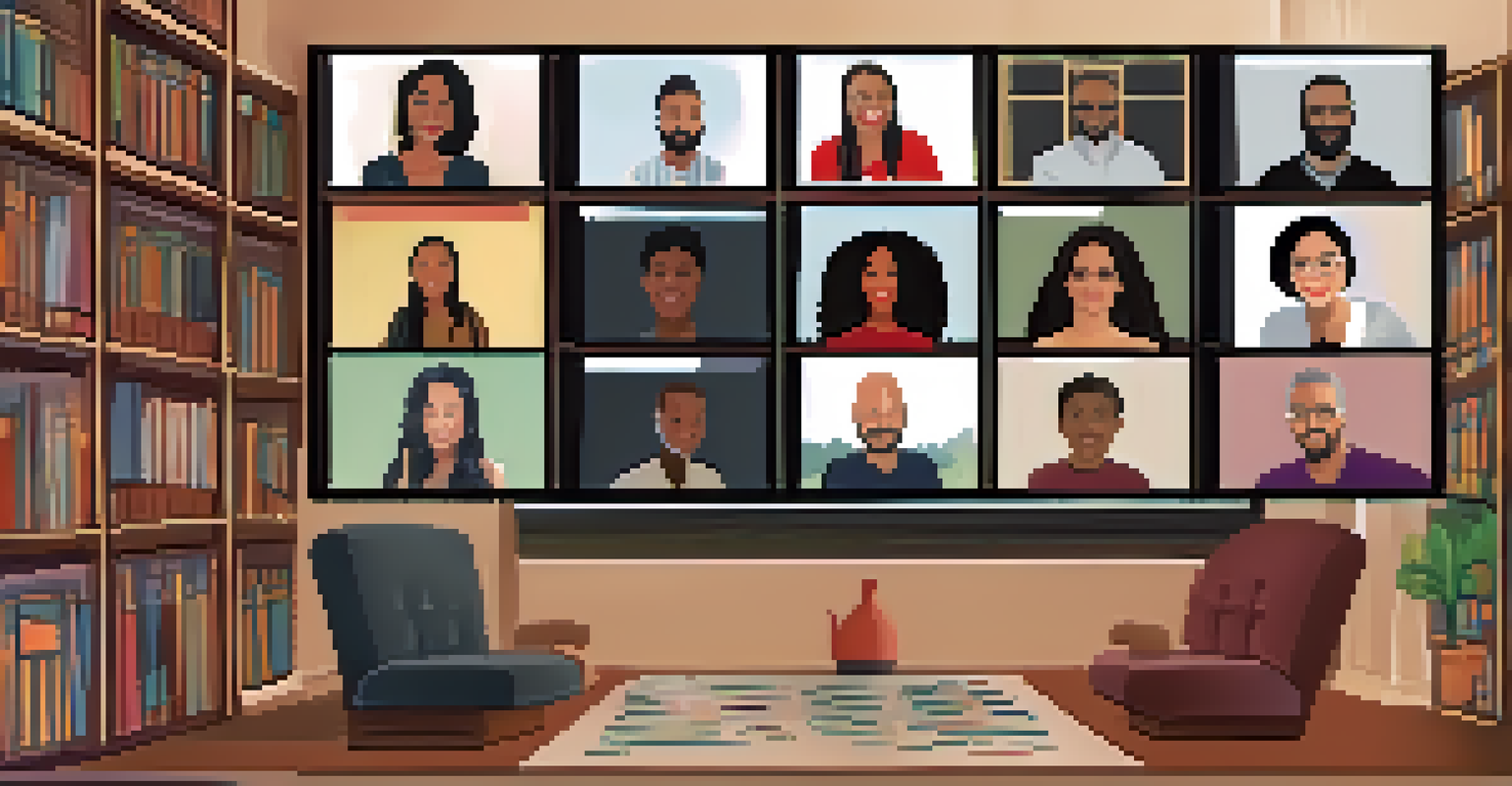Future Directions for Cultural Diversity Initiatives at MSU

Understanding Cultural Diversity at MSU: A Foundation
Cultural diversity is about more than just representation; it’s about fostering an inclusive environment where every voice matters. At MSU, understanding the nuances of different cultures enriches the educational experience for all students. This foundation sets the stage for future initiatives that aim to celebrate diversity and promote unity within the campus community.
In diversity, there is beauty and there is strength.
By acknowledging the distinct backgrounds and perspectives of students, faculty, and staff, MSU can create programs that resonate with everyone. This means not only recognizing differences but also advocating for equity and inclusion across all levels of the university. Emphasizing this understanding is crucial as we look ahead to new initiatives that can further enhance our cultural landscape.
Ultimately, a solid grasp of cultural diversity will help MSU develop targeted strategies that address specific needs and challenges. As we progress, it’s essential to keep this understanding at the forefront of our initiatives, ensuring that the foundation remains strong for future growth.
Developing Inclusive Curriculum for All Students
One significant future direction for cultural diversity initiatives is the enhancement of the curriculum to be more inclusive. Creating courses that reflect a variety of cultural perspectives can empower students to engage with global issues through diverse lenses. This not only enriches their learning experience but also prepares them for an increasingly globalized workforce.

Incorporating diverse authors, historical figures, and case studies into the curriculum can foster critical thinking and empathy among students. For instance, literature classes could feature works from authors around the world, allowing students to explore themes of identity and belonging from different cultural viewpoints. This approach not only broadens their understanding but also cultivates a sense of belonging among diverse student populations.
Fostering Cultural Inclusivity
MSU aims to create an inclusive environment by celebrating diverse backgrounds and advocating for equity among students, faculty, and staff.
Additionally, inviting guest speakers from various cultural backgrounds to share their experiences can provide students with real-world insights. These interactions can spark meaningful discussions and promote a deeper understanding of cultural diversity, making the learning environment more vibrant and inclusive.
Strengthening Community Engagement and Collaboration
Community engagement is vital for fostering cultural diversity initiatives at MSU. By building partnerships with local organizations and cultural groups, the university can create opportunities for students to engage with diverse communities. This not only enhances students' educational experiences but also strengthens the ties between the university and the local population.
We may have different religions, different languages, different colored skin, but we all belong to one human race.
Organizing cultural events, workshops, and service-learning projects can encourage students to immerse themselves in different cultures and perspectives. Such activities can help break down barriers and promote understanding, creating a richer campus culture that values diversity. For example, a collaborative festival showcasing various cultural traditions can provide a platform for students to learn about and celebrate differences.
Moreover, collaboration with community leaders can guide MSU in addressing the specific needs of underrepresented groups. By listening to community voices, the university can tailor initiatives that resonate with those it aims to serve, ensuring that efforts are both impactful and inclusive.
Utilizing Technology to Promote Diversity Initiatives
In today’s digital age, leveraging technology can play a crucial role in advancing cultural diversity initiatives at MSU. Online platforms can facilitate discussions, workshops, and resources that promote understanding and inclusivity among students and staff. This approach can be especially beneficial for reaching students who may not be able to participate in person due to various commitments.
Virtual events, such as webinars and panel discussions featuring diverse voices, can engage a wider audience and foster dialogue on critical issues related to cultural diversity. For instance, hosting an online series that addresses topics like racial equity or global citizenship can stimulate important conversations and encourage student involvement from the comfort of their homes.
Empowering Student Leadership
Encouraging students to lead cultural diversity initiatives fosters a sense of agency and belonging while enhancing their leadership skills.
Additionally, utilizing social media can be an effective way to share stories, promote events, and celebrate cultural diversity. By creating a vibrant online community, MSU can raise awareness, encourage participation, and keep the conversation going beyond the classroom.
Enhancing Support Services for Diverse Students
Providing robust support services for diverse students is essential to fostering a welcoming environment at MSU. This includes not only academic support but also mental health resources that cater to the unique experiences of students from various cultural backgrounds. By prioritizing these services, the university can create a safety net that encourages all students to thrive.
Developing mentorship programs that connect students with faculty and staff from similar backgrounds can help ease the transition into university life. These relationships can provide guidance, encouragement, and a sense of belonging, which are crucial for academic success. For example, a mentorship program can pair first-generation college students with mentors who understand their specific challenges.
Furthermore, offering workshops and training sessions that promote cultural awareness and sensitivity can help faculty and staff better support diverse students. By equipping the campus community with the tools to understand and respect different cultural backgrounds, MSU can create a more inclusive atmosphere that benefits everyone.
Promoting Student Leadership in Diversity Initiatives
Empowering students to take the lead in cultural diversity initiatives can have a transformative effect on the campus community. When students are given the opportunity to voice their ideas and implement their initiatives, they develop valuable leadership skills while fostering a culture of inclusivity. This approach not only enhances student engagement but also ensures that initiatives are relevant and impactful.
For instance, establishing student-led organizations focused on cultural diversity can provide a platform for students to share their experiences and advocate for change. These organizations can host events, discussions, and campaigns that promote understanding and celebrate cultural differences. By taking ownership of these initiatives, students can create a sense of agency and belonging within the university.
Utilizing Technology for Engagement
Leveraging technology, such as virtual events and social media, can enhance the promotion of diversity initiatives and broaden participation at MSU.
Additionally, involving students in decision-making processes regarding diversity initiatives can lead to more effective and resonant programs. By listening to student voices, MSU can better align its objectives with the needs and desires of its diverse student body, fostering a collaborative environment where everyone feels valued.
Measuring Success: Evaluating Diversity Initiatives
To ensure the effectiveness of cultural diversity initiatives, it’s crucial to establish clear metrics for success. Regularly evaluating programs and initiatives can provide valuable insights into what works and what needs improvement. This data-driven approach can help MSU refine its strategies and allocate resources more effectively to support diversity efforts.
Surveys, focus groups, and feedback mechanisms can be utilized to gather input from students, faculty, and staff. By actively seeking feedback from the community, MSU can better understand the impact of its initiatives and make informed adjustments. For example, if a particular event receives low attendance, understanding the reasons behind it can lead to more engaging and relevant programming in the future.

Ultimately, a commitment to continuous improvement is essential for the long-term success of cultural diversity initiatives at MSU. By regularly assessing progress and adjusting strategies, the university can ensure that it remains at the forefront of promoting inclusivity and understanding within its community.